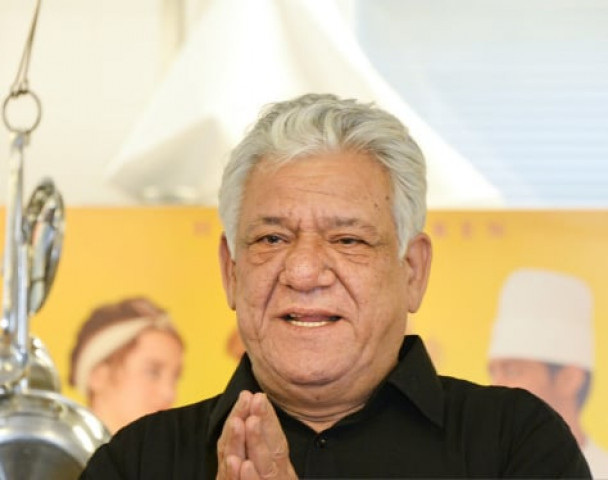Finding peace
"Oh, you're from Pakistan? Give me a big hug then." The irrepressible Om Puri responded to me with a huge smile

PHOTO: AFP
The setting was the Khushwant Singh Literary Festival (KSLF) at the picturesque Kasauli Club, Kasauli, India (October 9-11, 2015), my first-ever experience of attending a lit-fest as a guest/speaker. Kasuali, beautifully similar to Nathiagali, with its lolling hills, sparkling hues of green and serene natural splendour, is an Indian Army cantonment. Kasauli Club is run by army officers; some of the organisers of the KSLF are retired army officers — one a lieutenant general — and the chief guest was a serving general. And the most memorable part of the three-day festival to a book-lover like me was not just the constant flow of ideas and viewpoints, it was the overwhelming positivity shown towards the Pakistani guests. Not merely by the regular people in the audience, some local and many who had arrived from various parts of India to attend the KSLF. This positivity was manifested in the words and camaraderie shown by various Indian speakers: politicians, analysts, media personalities, writers, poets, actors and filmmakers.
Pakistani author denied Indian visa for literary festival
In my three trips to India, I’ve witnessed it personally. The mere mention of the word ‘Pakistan’ deepens smiles. Graciousness is enhanced, and a genuine desire to see peace between Pakistan and India is tangible in the warmth Indians exhibit towards their Pakistani guests. In Kasauli, the speakers from Pakistan included the former minister and Pakistan’s ambassador to the US, Syeda Abida Hussain, and the former foreign minister Khurshid Kasuri… yes, the same Kasuri who after Kasauli proceeded to Mumbai where his host for his book launch namaste’d India and the world dipped in black ink. There were a few serious questions posed to the Pakistani guests, but the pleasantness remained unwavering. Hussain and Kasuri responded to myriad questions about the issues that affect and shape the status quo between Pakistan and India, but with one constant: there was an unequivocal desire to move beyond the ghosts of the past, and work on chalking up a new narrative focused on resolving all short- and long-term issues.
Kashmir was a word that came into all discussions and some of the wisest comments came from the head of the Jammu & Kashmir National Conference, Farooq Abdullah, the Kashmiri politician who needs no introduction on both sides of the border. Whether you are in agreement or not with his views, there is one thing to be said about this charismatic politician: when he speaks, there’s an undisguised sincerity in his words as he reiterates, “… there is no alternative to talks between India and Pakistan”. Kashmiris on both sides of the LoC suffer as tensions between the neighbours escalate, thus bringing into focus the need to find an immediate and long-term solution to ceasefire violations.
Only Modi can stem the Hindu extremism he fanned: Kasuri
Another sagacious comment came from an unexpected quarter. A S Dulat, a former head of RAW, emphasised the need to resolve the Kashmir issue once and for all. “Kashmir needs to be resolved. Kashmir must be resolved. I don’t know why we are so touchy about the K-issue,” the veteran of Indo-Pak Kashmir dynamics summed it up quite succinctly. Yes, I’ve a feeling such remarks don’t go down too well with the Indian establishment. Establishments on both sides like to keep the tensions on a simmer, no? Hegemonic agendas trump the value of human life…
One of the most sobering moments of the trip was my brief interaction with a graceful woman from Mumbai. As we filled up our plates with biryani made by a Pakistani friend of the hosts of the last-day dinner and organisers of the KSLF, Rahul Singh and Niloufer Bilmoria, she spoke to me in gentle anguish: “What do you say about the Mumbai attacks?” As I’m a staunch endorser of the no-distinction-between-acts-of-terror and justice-for-ALL-victims-of-terror viewpoint, my answer was simple and heartfelt — that the perpetrators of the Mumbai attacks must be brought to justice. To her, this was deeply personal, “My sister was one of the victims. She was at the Taj for tea. And they killed her. My sister died for nothing.”
Shiv Sena disrupts Pakistani play in India
As I hugged her, I didn’t know how to offer my condolences. What do you say to the family member of a victim of terror? The only thing that could band-aid their wound is justice. The only thing that could bring them some semblance of closure is justice. The question we must ask our consciences today is: who will provide justice to the victims of terror? Of Peshawar. Of Quetta. Of Kabul. Of Mumbai.
Published in The Express Tribune, October 30th, 2015.
Like Opinion & Editorial on Facebook, follow @ETOpEd on Twitter to receive all updates on all our daily pieces.















COMMENTS
Comments are moderated and generally will be posted if they are on-topic and not abusive.
For more information, please see our Comments FAQ